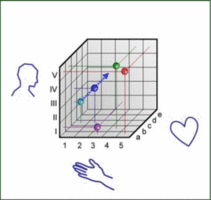
This project (503107-2009-DE-GMP) has been funded with support from the European Commission. This communication reflects the views only of the author, and the Commission cannot be held responsible for any use which may be made of the information contained therein.
Our Approach
The effects (or the impact) of informal learning can be displayed through the development of competence (e.g. empowerment, improvement of “soft” skills, activity level, self esteem, attitudes towards other groups, civic knowledge etc.).
Kernel of the LEVEL5 approach is a model to assess, evidence and validate the
• cognitive,
• activity related and
• affective
competence development of learners in informal and non-formal learning contexts.
Individual or group competences are evaluated in a process orientated way, visualised in a 3-dimensional cube model and fully documented in specific software system.
The LEVEL5 evaluation procedure is on the one hand standardised and enables at the same time grass-root projects to establish an individualised reference system for assessing and evidencing relevant competence of their beneficiaries in a process-orientated way.
The LEVEL5 system allows users to evidence the impact of their work according to a standardised procedure while, at the same time, keeping up their individuality as informal learning projects in their specific contexts.
With the help of LEVEL5 you can measure, display and evidence these impacts and give a convincing picture of the effects of your work. Starting from the fundamental question: “What is it exactly that you want to bring about for your target group?” we develop a progressive assessment system that leads to a profound analysis of the impact of those processes that you identify being elemental for your learners and beneficiaries.
You can either implement the system on your own via an internet auto-evaluation instrument or ask our REVEAL experts for support.
We also offer a so called blended consulting approach which is partly web-based with personal consulting units.
